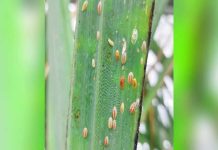ILOILO – Two infants younger than 30 days have been infected with pertussis, also known as whooping cough, leading to one fatality. In response, the Iloilo Provincial Health Office (IPHO) announced plans for random testing.
Whooping cough is a highly contagious respiratory disease known for causing violent coughing fits, making it difficult for the sufferer to breathe. This illness is particularly severe in young children and infants.
The first reported case was a 28-day-old girl from Balasan town, marking the province’s first pertussis-related death this year.
Both the infant and her mother had also tested positive for COVID-19, complicating the baby’s health with Acute Respiratory Distress Syndrome (ARDS) and critical pneumonia, leading to sepsis.
The second case involved a 21-day-old infant from Santa Barbara town, currently receiving treatment in a tertiary hospital in Iloilo City.
Dr. Maria Socorro Colmenares-Quiñon, head of the IPHO, explained that pertussis is suspected in individuals with a cough lasting at least two weeks, accompanied by symptoms such as paroxysmal coughing, inspiratory whooping, post-tussive vomiting, or apnea with or without cyanosis.
Confirmation comes through laboratory tests or epidemiological links to confirmed cases.
In response to reports of increasing respiratory symptoms among children, the IPHO plans to conduct random testing in communities, particularly targeting day care centers.
“Makuha kita nasal swab and throat swab sa bata nga nagasip-on para i-check kon ini bala flu-like or ordinary flu or COVID-19 or pertussis. Hopefully ma-start na kita next week,” said Quiñon.
This move aims to identify the cause of prolonged coughing, differentiating between ordinary flu, COVID-19, and pertussis infections.
Quiñon urged parents of symptomatic children to isolate them and avoid sending them to school to prevent further spread.
Teachers are also encouraged to allow sick students to stay home, promote hand hygiene, the use of masks, and maintain physical distancing in classrooms.
Pertussis spreads through droplets from coughs or sneezes and by touching contaminated surfaces.
Vaccination is the most effective prevention measure, included in the Pentahib vaccine series offered for free to infants starting from six weeks old.
The cases underscore the importance of vaccination and immediate medical attention for coughs that worsen or persist, as early treatment with antibiotics can shorten the disease’s duration and contagious period.
SIGNS AND SYMPTOMS
Symptoms usually develop around five to 10 days after infection, but can take as long as three weeks to appear. Infected individuals are most contagious during the first two weeks of symptoms. During the first one to two weeks of symptoms, an individual will experience symptoms resembling the common cold, such as fever, runny nose, and a mild cough.
Among infants, apnea (or pauses in breathing) is typical.
When the disease worsens, an individual will experience paroxysmal coughing–many, rapid, violent coughs followed by a “whoop” as the individual struggles to breathe and recover. Vomiting and exhaustion commonly follow these paroxysmal coughs.
This stage of the disease can last for one to six weeks and has been documented to last as long as 10 weeks.
The worse the condition, the more frequent the paroxysms, which would also become more common at night. Among babies, paroxysmal coughing is not very common; instead, during this stage, apnea is more common, becoming evident when the babies turn “blue” or cyanotic. During recovery, coughing fits can still return, although milder and less common, and may persist for many months.
MANAGEMENT, PREVENTION AND CONTROL
Antibiotics are recommended for treatment and can actually shorten the duration of the disease, as well as the time that an individual can infect other people. That is why it is very important to see a doctor once an individual develops a cough that keeps worsening or does not go away – or any of the other symptoms mentioned. Giving cough medications or cough syrups is not recommended.Pertussis is preventable through vaccination. The vaccine is given as a combination that also covers for diphtheria and tetanus. The vaccine is widely available and routinely given during infancy, with booster doses throughout childhood.
Vaccination can prevent infection, or in areas where the disease is still widespread, can make the course of disease milder.
To prevent the spread of pertussis or getting infected, proper cough and sneeze etiquette should be practiced at all times and taught to children regularly (e.g. cover your mouth and nose when coughing or sneezing with a tissue, handkerchief, or one’s upper sleeve or elbow — and NOT with your bare hand; dispose of used tissue properly; wash your hands with soap and water or alcohol-based sanitizer thoroughly for 20 seconds). As much as possible, at home, individuals displaying symptoms (e.g. coughs or colds) should be isolated from other people./PN





